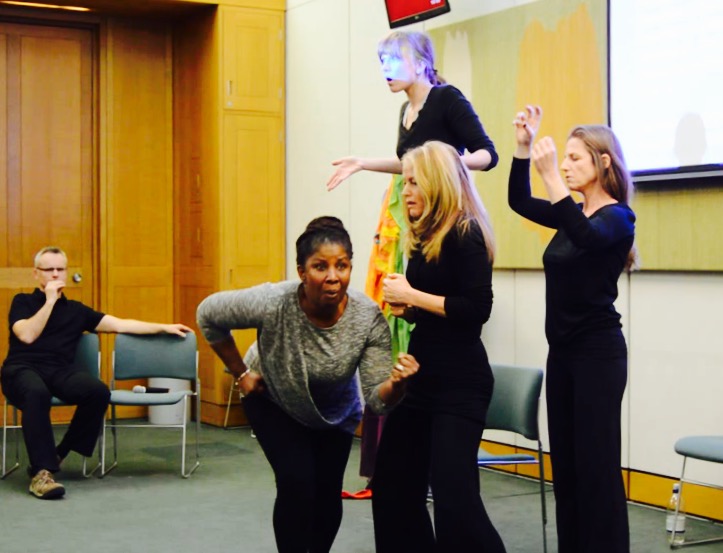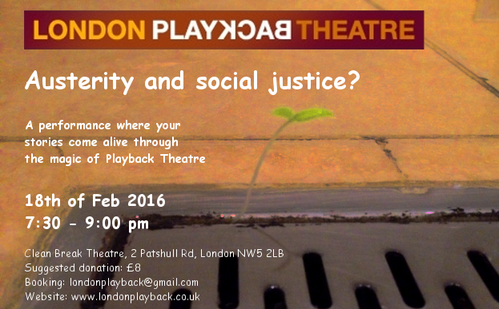|
Last night, at St Margaret's Girls School we explored the theme of beauty. I told a traditional Russian folktale about a painting competition that prompted discussion and questions such as - What is beauty? Who defines beauty? Do different cultures have different ideals and images of beauty? Then I guided students between 13-18 years old through a creative process of identifying beautiful moments they have experienced, and bringing them to life through theatrical storytelling. It was an inspiring, joyful evening as students told their stories to the group and appreciated beauty in their lives.
0 Comments
Tonight, London Playback Theatre performed at the House of Commons, and spontaneously enacted personal stories shared by audience members on the theme of austerity and social justice, and more specifically the way in which government cuts to public services are drastically affecting peoples everyday lives. We are hosting another event for more stories that speak to this theme to be told and heard.
Join us on Thursday 18th February, 7.30-9.30pm at Clean Break, 2 Patshull Road, Camden, London. The House of Commons event was held in collaboration with GlobalNet21, a leading forum in the UK for discussing the major issues in the 21st Century. The 7th annual Experiencing the Law conference, held on December 10 at Kings College, London addressed the topical issue - “Asylum Seekers, Migrants, Refugees and the Challenge of Human Rights.” Conference highlights included presentations by Helen Nianias, Rosie Brennan, Gauri Raje and Lesley Abdela who discussed their direct involvement and hands on work with refugees and asylum seekers. They each sensitively and passionately gave voice to the often neglected and untold personal stories of people who have sought refuge and asylum.
Freelance journalist, Helen Nianias, offered a snapshot of her recent visit to a refugee camp on the Greek island of Lesbos, managed by the International Rescue Committee. Nianias described the stench, unhygenic conditions and endless boredom endured by people living in the camp. She recounted stories of Syrian pharmacists and engineers who didn’t want to join Assad’s army and felt they had no choice other than to leave Syria. Nianias relayed the plight of young Afghan men who suffered at the hands of both the Taliban and ISIS in their home town, and planned to walk from Athens to Sweden upon being released from the refugee camp. Nianias posed the question: ‘How can we make British and European people engage and care about this human suffering?’ Rosie Brennan is a solicitor, Senior Lecturer in the Law School at Plymouth University, and Director of the Law Clinic, which offers a range of free legal services including advice for refugees. Brennan discussed the substantive interview that is a crucial part of registering an asylum claim. She argued that the asylum interview is a potential opportunity for refugees to speak about all they have been through and survived, yet often they are partially heard and misunderstood. Therefore the manner in which the asylum interview is conducted is fundamental and should be conducive to helping people tell their stories. Brennan pointed out that many interviewees are traumatised, exhausted and vulnerable. They may also be afraid of disclosing information that could jeopardise the safety of family members who have remained in their home country. Brennan advocated training officers who conduct asylum interviews with the vital skills and qualities of compassion and sensitivity, as well as the provision of appropriate interpreters who are able to converse fluently with interviewees. Brennan also highlighted some of the legal obstacles and painstaking struggles people undergo in the attempt to reunite their fractured families. Storyteller and anthropologist, Gauri Raje, outlined the storytelling courses she facilitates with groups of refugees and asylum seekers at immigration removal centres, or detention centres. Raje draws on traditional folktales, wonder tales and myths to encourage an exploration of human archetypes and to invite dialogue amongst group participants, particularly between people from different cultures and nationalities in detention centres. Raje described working with a women’s refugee collective, formed of women who had been raped. This group of women specifically requested to work with a storyteller to help them reflect on what had happened to them with greater distance and a new perspective. Raje elaborated on her storytelling approach and the core components of listening and witnessing, whereby group participants create a respectful community in which their experiences can be safely told and heard. Raje emphasised that witnessing involves more than focussing on stories of pain and suffering. An integral part of witnessing people’s stories is recognising and honouring each individual’s resilience and the fact that they have survived. Raje also contended that in order to remain within the Shengen borders, refugees are required to tell certain types of stories to the authorities about why they were compelled to leave their countries. Furthermore, through this storytelling process refugees are in danger of constructing new and often limited identities. Raje explained that when a refugee arrives within the Shengen borders they must present their case and tell a credible, believable story which includes their name, age, the country they come from, and the reason they left. The story revolves around flight, trauma and suffering, and they make an appeal for help and asylum. Raje claimed that a person’s life story is re-framed and severed within this partial, narrow story that becomes concretised through many re-tellings. Such narratives are closed narratives with a beginning, middle and end, and taken out of the larger and richer context of a person’s whole life experience which continues, is more open ended and has future possibilities. Raje warned of potentially damaging effects if a person’s story of flight and seeking refuge becomes the overriding and fixed life story, when in actuality this story is part of (albeit an often harrowing and dislocating part) of one’s broader and multi-faceted life experience. Senior Partner in Eyecatcher Associates, Lesley Abdela, has worked in over 40 post-conflict and post-disaster countries in the field of peace-building and post-conflict reconstruction, human rights, women’s rights and democratic empowerment. Abdela discussed the impact of war on women and girls with reference to her work in Kosovo, Nepal, Afghanistan and Indonesia. Abdela suggested various practical actions that can be taken to help protect women affected by war and to maintain their dignity. Examples of such ‘do-ables’, as she called them, include providing female interpreters for women who have been trafficked or abused and don’t want to speak to men, and providing basic and essential items such as clean underwear and sanitary pads. Abdela cited the ‘Bras for Bosnia’ campaign which was created by a fashion magazine and encouraged women to buy underwear for women caught in war. Other straightforward and concrete strategies Abdela mentioned that would help to reduce the risk of rape in refugee camps include ensuring that women distribute food to women so that it is less likely they will be raped in exchange for food, and not placing single women in bright orange tents which flags up that they are on their own (which was a situation that she witnessed). Abdela reflected that after armed conflict men who are wounded in war are often accorded dignity and respect, revered as heroes, and have statues built in their honour. In contrast, in many countries, women who have been raped in war are often punished and made to feel that they have brought shame upon their families. Abdela stated that this misguided perception and practice of blaming women is one of the most grievous human rights issues in war. She urged that perceptions and attitudes can be changed and work must be done in order that women who are raped in war are recognised as having been wounded, and need to be treated with dignity and respect. Further stimulating presentations were given by Bobby Duffy, Nirmala Pillay, and Eric Heinze who presented their research on immigration related issues. Managing Director of the Ipsos MORI Social Research Institute and Global Director of Ipsos Social Research Institute, Bobby Duffy, revealed recent research concerning public perceptions of immigrants. One example is the overestimation of the number of immigrants entering the UK which tends to exacerbate concern. Duffy pointed out the enormous impact of the media, particularly tabloid newspapers such as The Daily Express, Daily Mail and The Sun, which feed on fear and worry. Duffy also mentioned that the position of Britain within the European Union and the upcoming referendum has become fused with immigration related anxiety, and is posited as the main reason for British people wanting to leave the European Union. Researcher in the School of Law at Liverpool John Moore’s University with teaching interests in the areas of public law especially human rights, international law, jurisprudence and legal theory, Dr Nirmala Pillay asserted that International Human Rights Law is inadequate to meet the challenge of displaced people in the twenty first century. Pillay noted that the causes for the refugee crisis are both political and due to natural disasters, and the current scale of global forced displacement is unprecedented. Pillay analysed why there has been no coordinated European response to refugees, the difficulties associated with the Schengen agreement, and why people in need of safety and protection are being abandoned. Pillay concluded that short term reactive measures to emergency situations, (particularly in the run up to elections) are not ultimately effective, and a far ranging and cohesive response is required to meet this long term and complex crisis. Professor of Law and Humanities at Queen Mary, University of London, Eric Heinze, argued that fair and responsible refugee and asylum policies are now of urgent importance, yet he questioned whether such policies can or should include curbs on speech and whether other responses may be more effective. Heinze suggested that the typical starting point and conventional approach to the hate speech/freedom of speech debate, namely, how and when hate speech should be restricted, is not a useful framework. He explained that in Western longstanding, stable and prosperous democracies since the 1960s there has been no causal link between hate speech and harm. However there is a causal link between hate speech and harm in countries outside these stable democracies. Heinze proposed that within stable democracies the state rigorously enforces anti-discrimination and education programmmes that actively promote civic values such as pluralism and diversity. He discussed gay marriage as an example to demonstrate the way in which states have intervened to enable new dialogues and possibilities. Heinze’s argument is developed further in his forthcoming book, Hate Speech and Democratic Citizenship (2016). A major theme underscoring all the presentations at the 7th annual Experiencing the Law conference, “Asylum Seekers, Migrants, Refugees and the Challenge of Human Rights” was a clear call for a humane and compassionate response to people who are currently fleeing persecution and in urgent need of safety, shelter, and care. |
Archives
November 2023
|


 RSS Feed
RSS Feed